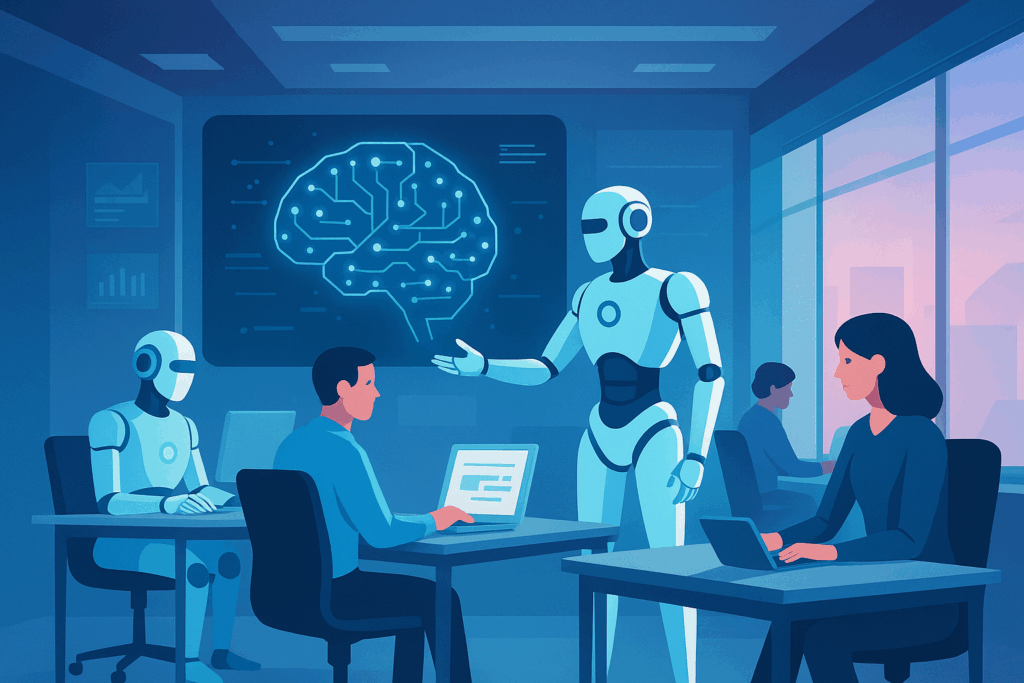
Introduction: Why AI is Changing the Job Market
Artificial Intelligence (AI) is no longer a futuristic concept — it’s here, shaping industries, businesses, and daily life. From healthcare to finance, education to marketing, AI is transforming how we work. But with this transformation comes an important question: Will AI take my job, or will it help me grow?
The truth is, AI isn’t just replacing jobs — it’s creating new ones. The real challenge for today’s workforce is to adapt, upskill, and future-proof careers by learning how to use AI effectively.
In this article, we’ll explore how you can stay relevant in the AI era, the skills you need, and practical steps to build a career that thrives alongside artificial intelligence.
- Jobs Most Affected by AI Automation
Not all jobs are equally at risk of being replaced by AI. Some tasks are highly automatable, while others still require human creativity, empathy, and complex decision-making.
Jobs Highly at Risk
Data entry clerks – AI can process information faster and with fewer errors.
Telemarketers – AI chatbots and voice assistants can handle scripted calls.
Cashiers – Automated checkouts are reducing human involvement.
Basic customer service roles – Chatbots are managing frequently asked questions.
Jobs Less Likely to Be Replaced
Healthcare workers (doctors, nurses, therapists) – AI can assist, but human judgment is critical.
Teachers and educators – AI supports learning but can’t replace human guidance.
Creative professionals (writers, designers, marketers) – Creativity and storytelling are uniquely human.
Skilled trades (plumbers, electricians) – Require hands-on work AI cannot replicate.
✅ Key Takeaway: Jobs are not disappearing — they are evolving. Learning AI skills can help workers transition into higher-value roles.
- High-Demand AI Skills for the Future
To thrive in the AI-driven job market, you don’t necessarily need to be a programmer. Instead, you need AI literacy — the ability to understand, use, and collaborate with AI tools.
Technical AI Skills
Machine learning basics
Data analysis with Python, R, or Excel
AI-powered automation tools
Natural Language Processing (NLP)
Non-Technical AI Skills
AI-driven decision-making – Understanding insights generated by AI.
AI project management – Leading projects that include AI integration.
AI ethics and governance – Ensuring fair and responsible use of AI.
Creative problem-solving – Using AI to support, not replace, creativity.
✅ Tip: You don’t need to master all AI skills — focus on those relevant to your career field.
- Practical AI Tools You Can Use Today
AI isn’t just for tech experts. Many tools are available for professionals in marketing, education, healthcare, and business.
ChatGPT & Gemini AI – Writing, brainstorming, coding assistance.
Grammarly & Jasper AI – Content writing and editing.
MidJourney & Canva AI – Graphic design made simple.
Notion AI & Trello AI – Productivity and project management.
DataRobot & Tableau AI – Data analysis and visualization.
✅ Action Step: Pick one AI tool today that aligns with your work and start experimenting.
- AI for Non-Tech Workers
One myth is that only programmers benefit from AI. In reality, AI can supercharge careers in non-technical fields too:
Teachers – AI tools for personalized learning and grading assistance.
Healthcare workers – AI-assisted diagnosis, treatment planning, and patient management.
Marketers – Predictive analytics, content generation, and targeted advertising.
Small business owners – Automating customer service, bookkeeping, and marketing.
✅ Example: A teacher using AI can create personalized lesson plans for each student, saving time and improving learning outcomes.
- Building an AI Learning Roadmap
If you’re serious about future-proofing your career, follow this roadmap:
- Start with AI literacy – Learn what AI is and how it impacts your industry.
- Take free courses – Platforms like Coursera, edX, and Google AI offer beginner-friendly courses.
- Experiment with tools – Use ChatGPT, Canva AI, or data analysis software in your daily work.
- Join AI communities – Connect with other learners on LinkedIn, Reddit, or AI forums.
- Stay updated – AI evolves quickly, so commit to continuous learning.
✅ Pro Tip: Dedicate just 1 hour a day to learning AI, and within months, you’ll have valuable skills to boost your career.
- Real-Life Examples of Career Growth with AI
A marketer learned AI-driven ad optimization tools and boosted client ROI by 200%.
A teacher integrated AI chatbots for student Q&A, saving 10 hours weekly.
A small business owner automated customer support with AI, cutting costs by 50%.
These real-world examples show how AI adoption isn’t about replacement — it’s about enhancement.
Conclusion: Embrace AI or Be Left Behind
Artificial Intelligence isn’t the enemy of your career — it’s the partner you need to thrive in the future. The question is not whether AI will change your industry, but whether you’ll adapt in time.
By learning essential AI skills, experimenting with AI tools, and staying ahead of trends, you can future-proof your career and open doors to exciting opportunities.